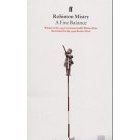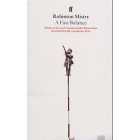 I’m going to write this in English for a change.
I’m going to write this in English for a change.
In July 1998, in Manchester, a friend saw I was reading “The God of Small Things” by Arundhati Roy and asked if I liked it. I said I liked the atmosphere but it seemed I was stuck at some point and couldn’t get further. Then Heather suggested that I might like Rohinton Mistry’s “Fine Balance” which had been published two years ago and was a great hit in Canada.
Then I came back to Greece, I never finished Roy’s book, I completely lost contact with Heather although she seemed to be a very interesting and joyful person. The last I knew of her she was working as an EFL teacher in UAE (that’s United Arab Emirates for you).
In January I discovered the bookring activity of bookcrossing and as I have already written it excited me very much. Among the books I signed up for was this one.
I’m really very happy I read this book and I regret having delayed it so much, although it has left me with a depressing feeling, a feeling of impotence. It’s a book relaying mainly the stories of four people in India in the seventies but also of a whole country going backwards and forwards in time. It’s the period under the Indira Gandhi’s power although she is never named explicitly. The names of the cities are not spelled either. Not that they matter anyway.
It’s a political book and a story about human relationships too. It is a tragi-comic book indeed where the moment you start laughing, laughter is violently interrupted by some magnificent tragedy.
The main heroes are a woman who tries to live independently despite her family and lack of education, a young man of middle class who goes to the big city to study and faces a reality very different form the one in his small town, an uncle and his nephew, former untouchables, who managed to change their destiny but succumb to India’s reality many years later. These four people’s lives inter mingle in fascinating ways and we also get to know tens of other characters who create a magnificent mosaic.
There’s only a short part of the book where the heroes live all together and enjoy some kind of happiness. It is so perfect, so harmonious that we can’t help worrying that it’s not going to last.
The ending is so sad, so breathtaking that I can’t stop thinking about it. I’ve read other books about India or by Indian writers too. Let me make a list now (although I confess I had to do a mini research and get up from the keyboard to the bookshelves)
I’ve read:
R. K. Narayan – “The English teacher”,
Hari Kunzru “The impressionist”,
Arundhati Roy “The God of Small Things”,
Salman Rushdie “The Moor’s Last Sigh”
Jhumba Lahiri “The namesake”
Meera Syal “Life isn’t all Ha Ha Hee Hee”
Rajeev Balasubramanyam “In beautiful Disguises”
They are mostly by second generation Indian immigrants who write in English which is ironic at least. Looking up about this book I also came upon this wikipedia article about the ongoing debate about Indian Writing in English. The main point is whether Indian writers or writers of Indian origins who write in English write better than Indian writers. Obviously I am a fan of Indian themed literature but I haven’t read anything written originally in one of the many Indian languages so I can’t tell.
So to come back to this last book about India to say that it was well written it is an understatement. It really is unputdownable and towards the end I wanted so much to find out what would happen to the heroes I skipped descriptive parts and read only the plot. Then I went back and read the parts I had skipped again.
I’ll end this by quoting a piece about time from the book that sets the pessimistic tone of the whole story:
“What an unreliable thing is time – when I want it to fly, the hours stick to me like glue. And what a changeable thing, too. Time is the twine to tie our lives into parcels of years and months. Or a rubber band stretched to suit our fancy. Time can be the pretty ribbon in a little girl’s face. Or the lines in your face, stealing your youthful colour and your hair. But in the end, time is a noose around the neck, strangling slowly”.
A big thanks to the friends of bookcrossing with whom I’m sharing this bookring, I hope you all enjoy it as much as I did.
Ελληνικά τώρα: Το βιβλίο έχει μεταφραστεί και στη γλώσσα μας.
Πως σας φαίνεται το καινούριο μου σπίτι; Δεν έχω κρεμάσει ακόμη κουρτίνες και πίνακες στους τοίχους αλλά λειτουργούμε κανονικά!


με γεία! (σου κάνω και ποδαρικο νομίζω).
Θα κάνεις και house warming party?
LikeLike
Ευχαριστώ Βασίλη. Πολύ καλή η ιδέα του πάρτι!
LikeLike
Σιγά σιγά όλοι μετακομίζεται προς wordpress…
Άννα η βιβλιοθήκη σου τα λέει όλα!!!
LikeLike
Καλή συνέχεια στο νέο σου σπιτικό… Μην το πολυστολίσεις, είναι ωραίο κι έτσι. Μίνιμαλ και βιβλιοφιλικό. Τη συμπάθειά μου σου στέλνω
LikeLike